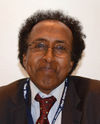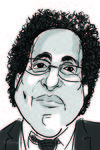Mohamed Ibrahim
Mohamed Ibrahim is the Founding Chairman of ISOC Somalia,[1] the Project Manager of the .so registry,[2] a Research Fellow at University of Melbourne, an advisor to Somalia's Minister of Posts and Telecommunications, the Chairman of the Centre for Research and Dialogue,[3] and Somalia's IGF[4][5][6]He has attended a number of ICANN conferences, and is becoming involved in the ccNSO and GAC on behalf of Somalia;[7][8] he also represents the country at other fora, such as in AfTLD.[9]
 |
 |
| Country: | Somalia |
| Email: | mi [at] ayuub.org |
| Website: | |
| LinkedIn: |
Current Work
Mr. Ibrahim was contracted to re-establish and modernize the Somalian registry, which has only been active since June 2010; he is leading a number of important development projects. These include working to implement the fast track process for Somalia's Arabic based IDN, and launching an innovative program to give free websites to all Somalis. The latter project involves giving individuals domains based on their first and last names under the .me.so domain space; it was launched in front of the many Somali students studying in Kuala Lumpur in May, 2011.[10]
Thus, he is involved in both updating and implementing the basics necessary for any registry,[11] and trying to give Somalia the opportunity to lead unique projects.
Mr. Ibrahim has been a Lecturer/EdTech at Higher Colleges of Technology, UAE; and CIO Peninsula Health, Victoria.[12]
Interests
While much of his career has been spent in the ICT sector, his interests as a scholar extend to globalization, the role of NGOs in developing countries, the place of ethics and morality in society, religious radicalism, and other areas where technology and humanity intersect.[13] His various projects involving Somalia stem from his interest in establishing functioning ICT and education systems there.[14] He is also interested in wireless technology and it's potential to create opportunities for communication, and how that is balanced with its negative tendency to distract and saturate society.[15]
References
- ↑ isoc.org
- ↑ elists.isoc.org
- ↑ Arts.Monash.edu.au
- ↑ ICANN 41 Interview
- ↑ aftld.org
- ↑ linkedin.com
- ↑ registration123.com
- ↑ registration123.com
- ↑ AfTLD.org
- ↑ ICANN 41 Interview
- ↑ ccNSO.ICANN.org
- ↑ LinkedIn.com
- ↑ Arts.Monash.edu.au
- ↑ eLists.isoc.org
- ↑ [http://www.elon.edu/e-web/predictions/igf_2010/survey_mobile.xhtml Elon.edu}